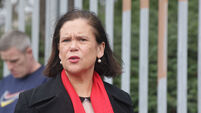Truth is, Gore’s movie is no bore
It was sponsored by the Green Party who invited representatives of other parties to attend. Being a bit of a cynic when it comes to matters political, I was surprised that so many of them showed up. Pat Rabbitte and the Overseas Aid Minister, Conor Lenehan, were there and the Dublin-based Green TDs were joined by Fiona O’Malley, Eamon Gilmore and Fergus O’Dowd.
But then, coalition with the Greens is a very real possibility after the next general election and it’s in the interests of other parties to cultivate good relations with them. Gore’s film concerns global warming and I wondered what went through the minds of our public representatives as the extent of this intractable problem was laid before them.














